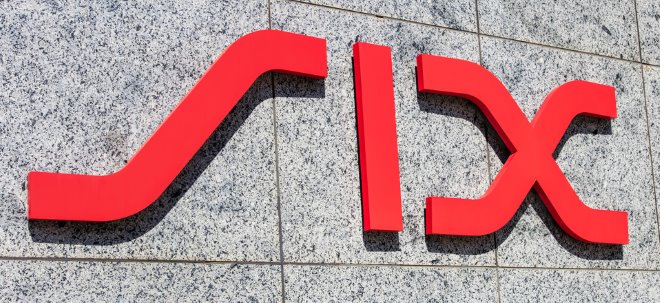|
19.12.2024 07:00:00
|
Roche’s Phase IIb study of prasinezumab missed primary endpoint, but suggests possible benefit in early-stage Parkinson’s disease
- PADOVA study showed numerical delay in motor progression and positive trends on multiple secondary and exploratory endpoints
- Prasinezumab continues to be well tolerated and no new safety signals were observed
- Roche is further evaluating the data and will work together with health authorities to determine next steps
Basel, 19 December 2024 - Roche (SIX: RO, ROG; OTCQX: RHHBY) announced today results from the Phase IIb PADOVA study investigating prasinezumab in 586 people with early-stage Parkinson’s disease, treated for a minimum of 18 months while on stable symptomatic treatment. Prasinezumab showed potential clinical efficacy in the primary endpoint of time to confirmed motor progression with a HR=0.84 [0.69-1.01] and p=0.0657, missing statistical significance. In a pre-specified analysis, the effect of prasinezumab was more pronounced in the population treated with levodopa (75% of participants), HR=0.79 [0.63-0.99]. Consistent positive trends across multiple secondary and exploratory endpoints were also observed. Prasinezumab continues to be well tolerated and no new safety signals were observed in the study.
"Parkinson’s is complex and devastating with no disease modifying treatment options available for the millions of people impacted,” said Levi Garraway, M.D., Ph.D., Roche’s Chief Medical Officer and Head of Global Product Development. "We believe the consistent efficacy trends from the Phase IIb study of prasinezumab merit further exploration. We will continue our close collaboration with the Parkinson’s community as we further evaluate the data to determine next steps.”
The Phase II PASADENA and Phase IIb PADOVA open-label extension studies will continue in order to explore the observed effects in both studies. Roche will continue to evaluate the data and work together with health authorities to determine next steps.
Full results from the PADOVA study will be presented at an upcoming medical meeting.
About prasinezumab
Prasinezumab is an investigational monoclonal antibody designed to selectively bind aggregated a-syn and reduce neuronal toxicity. By targeting the build-up of a-syn protein in the brain, prasinezumab can potentially prevent further accumulation and spreading between cells, thereby slowing down the progression of the disease. The evidence supporting targeting a-syn aggregates as a mechanism of action in Parkinson’s disease is based on a wide range of scientific evidence in the field.
Prasinezumab is currently being assessed in ongoing open-label extensions of the Phase II PASADENA and Phase IIb PADOVA studies. Four-year data from the PASADENA study showed potential evidence of sustained slowing of motor progression compared to a matched PPMI natural history study cohort, published in the October 2024 edition of Nature Medicine. The PASADENA delayed-start (n?=?94) and early-start (n?=?177) groups showed a slower decline (a smaller increase in score) in MDS–UPDRS Part?III scores in the OFF state (delayed start, -51%; early start, -65%) than did the PPMI external comparator (n?=?303). The safety database for prasinezumab consists of data from more than 900 Parkinson’s disease study participants that have been treated with the investigational medicine, including more than 500 who were treated over 1.5-5 years.
Roche entered into a Licensing, Development, and Commercialisation agreement with Prothena in December 2013 to develop and commercialise monoclonal antibodies targeting a-syn, such as prasinezumab, for the treatment of Parkinson’s disease.
About the PADOVA study
PADOVA is a Phase IIb multicentre, randomised, double-blind trial evaluating the efficacy and safety of prasinezumab compared with placebo in 586 randomised patients with early-stage Parkinson’s disease who were on stable symptomatic treatment (stable doses of levodopa or monoamine oxidase-B inhibitor as monotherapy for more than three months at baseline). Patients receive monthly intravenous doses of prasinezumab 1500 mg or placebo every four weeks for at least 76 weeks. This is followed by a two-year open-label extension phase in which all participants receive active treatment, which is currently ongoing.
The primary endpoint of PADOVA is the time to confirmed motor progression of Parkinson’s disease (=5-point increase in Movement Disorder Society-Unified Parkinson’s Disease Rating Scale [MDS-UPDRS] Part III score assessed in OFF medication state). A 5-point increase in MDS-UPDRS Part III represents a clinically meaningful motor progression event (Trundell et al., in press).
About Parkinson’s disease
Parkinson's disease is a chronic, progressive and debilitating neurodegenerative disease characterised by the gradual loss of neurons that make dopamine and other nerve cells, and the development of motor and non-motor symptoms that may appear years before diagnosis. Today, PD affects over 10 million people worldwide. The prevalence of Parkinson’s disease is increasing, and it has become one of the fastest-growing neurological disorders. Currently, symptomatic treatments that effectively alleviate motor symptoms are available today, having a significant impact on people’s quality of life; however, no available symptomatic therapies slow down or stop the clinical progression of Parkinson’s disease and the effects wear off over time as the disease progresses.
Roche is evaluating multiple approaches to slow down disease progression and potentially prevent Parkinson’s disease that involve targeting underlying disease processes such as aggregated a-syn production, lysosomal dysfunction and neuroinflammation.
About Roche in Neuroscience
Neuroscience is a major focus of research and development at Roche. Our goal is to pursue groundbreaking science to develop new treatments that help improve the lives of people with chronic and potentially devastating diseases.
Roche is investigating more than a dozen medicines for neurological disorders, including neuromuscular diseases: Duchenne muscular dystrophy, facioscapulohumeral muscular dystrophy and spinal muscular atrophy; neuro immune diseases: multiple sclerosis and neuromyelitis optica spectrum disorder; and neurodegenerative diseases: Alzheimer’s disease, Parkinson’s disease and Huntington’s disease. Together with our partners, we are committed to pushing the boundaries of scientific understanding to solve some of the most difficult challenges in neuroscience today.
About Roche
Founded in 1896 in Basel, Switzerland, as one of the first industrial manufacturers of branded medicines, Roche has grown into the world’s largest biotechnology company and the global leader in in-vitro diagnostics. The company pursues scientific excellence to discover and develop medicines and diagnostics for improving and saving the lives of people around the world. We are a pioneer in personalised healthcare and want to further transform how healthcare is delivered to have an even greater impact. To provide the best care for each person we partner with many stakeholders and combine our strengths in Diagnostics and Pharma with data insights from the clinical practice.
For over 125 years, sustainability has been an integral part of Roche’s business. As a science-driven company, our greatest contribution to society is developing innovative medicines and diagnostics that help people live healthier lives. Roche is committed to the Science Based Targets initiative and the Sustainable Markets Initiative to achieve net zero by 2045.
Genentech, in the United States, is a wholly owned member of the Roche Group. Roche is the majority shareholder in Chugai Pharmaceutical, Japan.
For more information, please visit www.roche.com.
All trademarks used or mentioned in this release are protected by law.
Roche Global Media Relations
Phone: +41 61 688 8888 / e-mail: media.relations@roche.com
|
Hans Trees, PhD Phone: +41 79 407 72 58 |
Sileia Urech Phone: +41 79 935 81 48 |
|
Nathalie Altermatt Phone: +41 79 771 05 25 |
Lorena Corfas Phone: +41 79 568 24 95 |
|
Simon Goldsborough Phone: +44 797 32 72 915 |
Karsten Kleine Phone: +41 79 461 86 83 |
|
Nina Mählitz Phone: +41 79 327 54 74 |
Kirti Pandey Phone: +49 172 6367262 |
|
Yvette Petillon Phone: +41 79 961 92 50 |
Dr Rebekka Schnell Phone: +41 79 205 27 03 |
Roche Investor Relations
|
Dr Bruno Eschli Phone: +41 61 68-75284 e-mail: bruno.eschli@roche.com |
Dr Sabine Borngräber Phone: +41 61 68-88027 e-mail: sabine.borngraeber@roche.com |
|
Dr Birgit Masjost Phone: +41 61 68-84814 e-mail: birgit.masjost@roche.com |
Investor Relations North America
|
Loren Kalm Phone: +1 650 225 3217 e-mail: kalm.loren@gene.com |
Attachment

Nachrichten zu Roche Holding AG (Inhaberaktie)
|
17.01.25 |
Pluszeichen in Zürich: SPI nachmittags in der Gewinnzone (finanzen.ch) | |
|
17.01.25 |
Optimismus in Zürich: SPI steigt (finanzen.ch) | |
|
17.01.25 |
SPI-Papier Roche-Aktie: So viel Gewinn hätte ein Investment in Roche von vor einem Jahr abgeworfen (finanzen.ch) | |
|
17.01.25 |
Aufschläge in Zürich: SPI liegt zum Start im Plus (finanzen.ch) | |
|
16.01.25 |
Optimismus in Zürich: SPI beendet den Donnerstagshandel in der Gewinnzone (finanzen.ch) | |
|
16.01.25 |
Aufschläge in Zürich: Am Nachmittag Pluszeichen im SPI (finanzen.ch) | |
|
16.01.25 |
Freundlicher Handel: SPI liegt am Donnerstagmittag im Plus (finanzen.ch) | |
|
16.01.25 |
Gute Stimmung in Zürich: SPI beginnt Donnerstagshandel mit Gewinnen (finanzen.ch) |
Analysen zu Roche Holding AG (Inhaberaktie)
KI gefragt: Aktien für die Ewigkeit – Wall Street Live mit Tim Schäfer
In unserer heutigen Folge spricht Tim Schäfer im Interview mit David Kunz, COO der BX Swiss AG über eine Auswahl an Aktien, welche von einer künstlichen Intelligenz prognostiziert wurden. Diese Titel sind laut KI optimal für ein langfristiges Buy and Hold Portfolio.
Welche Meinung haben Tim Schäfer und David Kunz vom Portfolio und halten diese Titel langfristig stand? Diese und weitere Fragen beantwortet Tim Schäfer in der heutigen Ausgabe von Wall Street Live.
In unserem zweiwöchigen Format „Wall Street Live“ mit Tim Schäfer behandeln wir Topaktuelle Themen des Marktgeschehens.
👉🏽 https://bxplus.ch/wall-street-live-mit-tim-schaefer/
Inside Trading & Investment
Mini-Futures auf SMI
Meistgelesene Nachrichten
Börse aktuell - Live Ticker
SMI geht mit Gewinnen ins Wochenende -- DAX schliesst höher und knackt erstmals 20'900-Punkte-Marke -- Wall Street schlussendlich stärker -- Asiens Börsen letztlich uneinheitlichDer heimische Aktienmarkt zeigte sich vor dem Wochenende freundlich und überschritt zeitweise sogar die 12'000-Punkte-Marke. Der deutsche Leitindex setzte seine Rekordrally fort und knackte erstmals die 20'900 Zähler. Die US-Börsen notierten im Freitagshandel mit Gewinnen. Die Börsen in Fernost fanden am Freitag keine gemeinsame Richtung.
finanzen.net News
| Datum | Titel |
|---|---|
|
{{ARTIKEL.NEWS.HEAD.DATUM | date : "HH:mm" }}
|
{{ARTIKEL.NEWS.BODY.TITEL}} |

